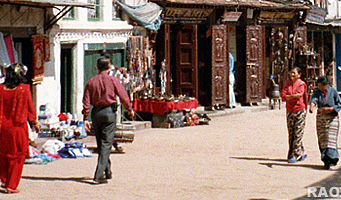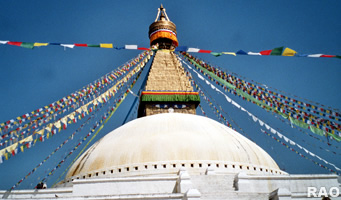 |
Nepal Religion |
|
 |
Nepal Information |
|
|
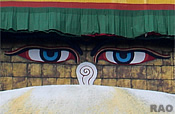 |
|
Fables
of Boudhanath and Changunarayan
|

|
Nepal
is known as a nation of mountain and monuments. Most outsiders come to
this country to view the magnificent mountainsand the ancient monuments.
However for the local people, there are different shrines which hold much
attraction.
 |
| This
is another fantastic Buddhist Stupa at a place known as Boudha,
about seven kilometers east of Kathmandu. The largest spherical
stupa is held in great veneration both by Lamas of Nepal and Tibetans and also by Nepali Hindus. Legend has it that a king in ancient
time built a pond with stone water spouts near the present Royal Palace.
Since
water did not come out of the water spout, the King began to worry about
it. After deep meditation, it dawned upon him that water would not flow
outof the water spouts unless a person endowed with all the 32 virtues was sacrificed to the water spouts. |
|
 |
Determined
as he was to make the waterflow out of the water spouts, he asked his son
to be where he had built the pond with the water spouts at mid-night and
chop off the head of a person he would see lying there wrapped in white
cloth. The Prince did as he was ordered by his father King. No sooner than
the head of the king was severed, water started flowing out of the spouts.
The scene was so ghastly that one of the carved water spouts turned its
face towards the sky.
The
pond and the water spouts are near the Royal Palace. The water spouts
which looked towards the sky is now replaced.
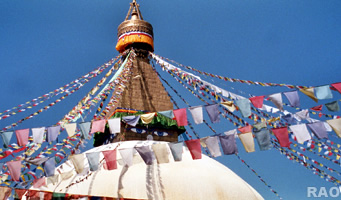 |
| The
Prince stood aghast at the sight because, the head which he had severed
was that of his father. The Prince went somewhere near the shrine of Goddess
Bajrajogeni in Shankhu, east of Kathmandu. He lived an austere life
praying to Goddess Bajrajogeni for several years.
The
Goddess pleased with his prayer, asked the Prince to build a temple of
the Buddha to atone for his sin. |
|
The
Prince started building the Stupa, but because of the 12-year drought that
followed, he had to collect dew from cloth kept in the open throughout
the night. This delayed the completion of the Stupa as dew could be collected
only in winter.
The Stupa being built by a Hindu king for the Bhuddhists is held in great veneration
both by the Buddhists and the Hindus. The Stupa is regarded as sacrosanct
as the Swoyambhunath Stupa surrounded by houses with shops offering
sundry items made by Lamas and Tibetan refugees.
| Changu
Narayan |
 |
The Changu
Narayan tempel is on way to the historical as well as mythological
township of Sankhu, about 16 km east of Kathmandu. The temple built
by a Lichhivi king in 325 AD is only about 4 km from Bhaktapur, but the
shrine of Changu Narayanhas been there for thousands of years. The
interesting mythological account of the shrine is that Bali, the king of
monkeys, was killed for not fault of hs own by Lord Rama for the
sake of his sworn friend Sugriva who was younger brother to Bali.
Lord Rama had promised dying Bali that he would pay back by giving his
own life for Bali's life in his next birth.
The
hill on which the temple of Changu Narayan stands today was then
known as Doli Giri where Bali lived a saintly life in his next birth
with his own herd of cattle. The saint was intrigued when he marked that
one of his cows which gave much milk had begun to come back from the forest
with her under almost emptied every evening.
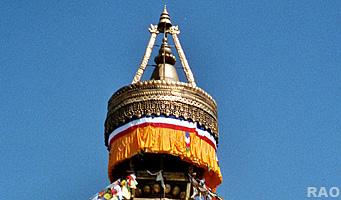 |
| He
shadowed the cow only to find that the cow was giving her milk to a stranger
on the hill. Infuriated, the saint whipped his sword to cut man's head
off, but to his surprise he found the man turned into a tree and it was
the tree which he had cut. Immediately Lord Vishnu with each of his four
hands holding the conch, the Chakra (a whirling circular weapon exclusive
to the Lord), the club and the Padma (lotus shaped weapon) was
there on the stump of the tree. |
|
The
saint regretted and supplicated the Lord for his forgiveness. The lord
reminded the saint of hw he had given words to the saint in his previous life
as Bali. Even toay the image of the Lord though on Garudha,
His carrier, is partly placed on the tree stump in the temple.
| more
information |
 |
|





